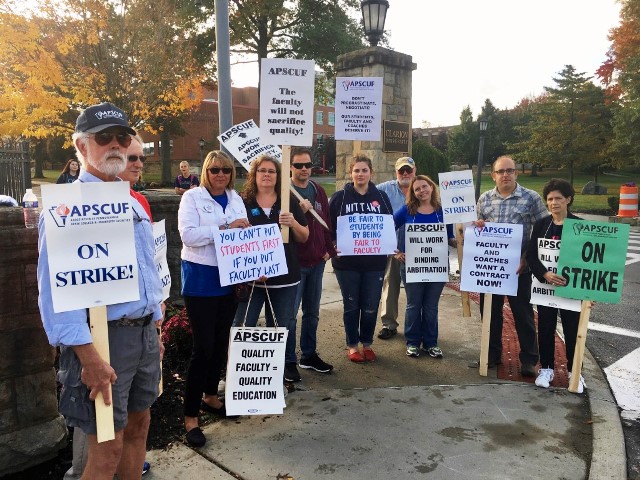
Faculty members at all 14 state-owned universities are on the picket lines for a second day after a strike began 5 a.m. Wednesday, Oct. 19.
Meanwhile, Association of Pennsylvania State College and University Faculties negotiators still are waiting for Pennsylvania’s State System of Higher Education to return to the bargaining table.
“We waited until 5 a.m. before the strike, even after the State System told us they were done talking — and we continued to wait even on the picket lines — for a call from the State System to signal they were ready to settle a contract so our faculty members can return to their students,” APSCUF President Dr. Kenneth M. Mash said. “We even took to social media to ask them [to] return, but they did not go to the table.”
The day before the strike, negotiators were in their fifth consecutive day of talks at a neutral location. Tuesday afternoon, Gov. Tom Wolf issued a statement urging the sides to settle the contract and avoid a strike. But around 8:45 p.m., the State System handed APSCUF a last best offer and said it was done negotiating. APSCUF stated that after the fact, the State System spokesperson said their team was waiting around.
“They told us they were done talking to us, they lifted the media embargo that was in place during negotiations, and they gave us a ‘last, best offer,’ which is negotiations speak for ‘go on strike,’” Mash said. “If they stayed, it was only for appearances. It’s clear the real decision-makers were finished for the night.”
APSCUF reviewed the 25-page proposal from the State System. According to APSCUF, the system wants to:
- Cut funding for faculty scholarship and professional development that allows faculty to bring current knowledge to their classes.
- Substantially increase the number of interns faculty members would be required to supervise — by 67 percent, with no additional pay.
- Put adjunct faculty members, 60 percent of whom are women, on a separate — lower — salary scale. APSCUF is concerned about this as a pay-equity issue, Mash said. While the State System’s proposal did include raises, those raises were higher for higher-ranking faculty and lower for lower-ranking ones, a further unfairness APSCUF believes was meant to divide union members, Mash said. APSCUF is proud to have adjunct faculty members in its union and wants them treated with the same respect as tenured professors, Mash said.
- Cut faculty benefits and charge more for them, even after APSCUF “accepted dramatic reductions in our healthcare coverage and accepted proposals to shift millions of dollars in healthcare costs to our members by accepting deductibles, increased copays for prescriptions and other givebacks,” Mash said. “But these concessions weren’t enough for the State System and Frank Brogan.”
- Take millions more in concessions from faculty than any other employees. APSCUF offered a wage package substantially smaller than other state employees, by a factor of $31 million for a bargaining unit of more than 5,000, Mash said.
APSCUF also indicated that other issues of concern in the State System’s proposal include changing the tenure and promotion processes, the removal of grievance rights for evaluations, delaying retrenchment decisions, making it easier to retrench, and making it harder for retrenchees to get benefits and find new jobs. Meanwhile, the chancellor and the university presidents took substantial pay increases last year.
APSCUF members will remain on strike until negotiators reach a contract agreement APSCUF believes is fair to students and to faculty. APSCUF will announce when it schedules a next negotiations session.
“… Let’s devote our full energies to reaching an agreement so that the students get back to the classroom,” Mash said.
This is the first strike in APSCUF’s history. The faculty contract expired June 30, 2015, and negotiations have been ongoing since late 2014.
APSCUF represents about 5,500 faculty and coaches at the State System universities: Bloomsburg, California, Cheyney, Clarion, East Stroudsburg, Edinboro, Indiana, Kutztown, Lock Haven, Mansfield, Millersville, Shippensburg, Slippery Rock, and West Chester Universities of Pennsylvania.
Click here to read the previous report.